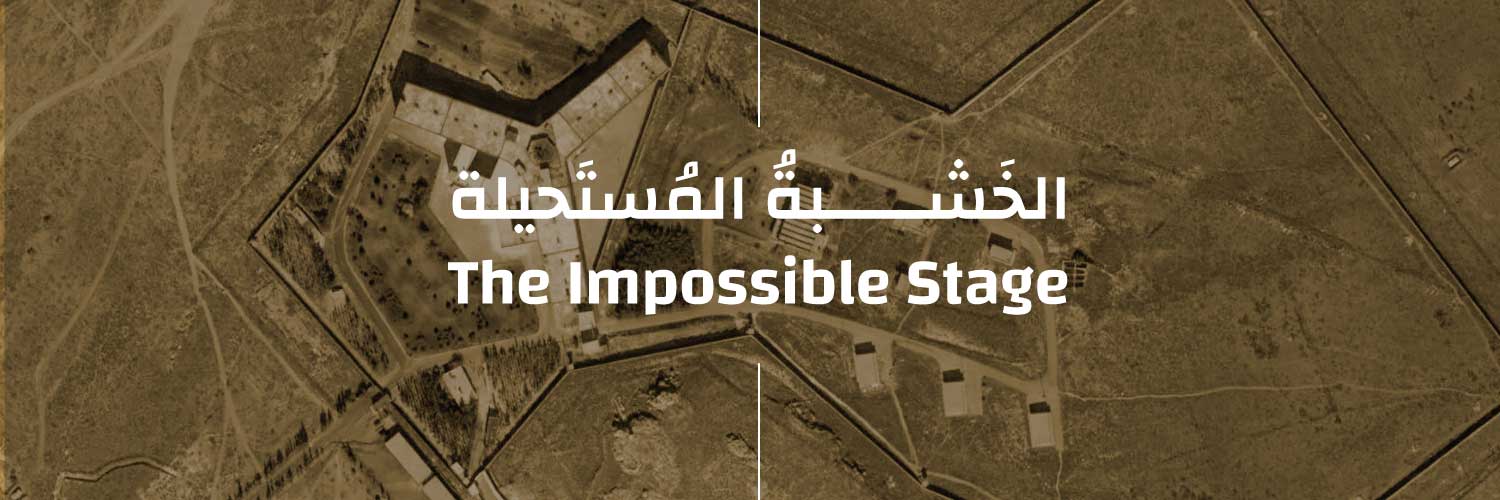
THE IMPOSSIBLE STAGE | EPISODE [1]
Launch of the Podcast Series & Talk with the Team
Via Zoom
MAY 31, 2021
On Monday, May 31, 2021, the MENA Prison Forum (MPF) launched the first episode of the radio drama series The Impossible Stage. The series aims to explore and display the engagement of prisoners in Syria with theatre, specifically the activities of prisoners inside the notorious Saydnaya prison to curate a theatre within the prison in the late 1980s. Following the screening of the episode, there was a discussion with the artists and technicians, who articulated the background and process of developing the process.
A main objective of the MPF is to use art as advocacy as a move away from the solid and repetitive language of the human rights reports and policy papers. The Forum believes in engaging a wider audience into the conversations, debates, and struggles that have to do with the grievances and everyday lives of the prisoners across the MENA region. This is indeed what drew Jaber Baker to undertake this project with the MPF. Baker was born in 1981 and spent many years in Saydnaya prison. While he personally was not in the prison during the years of the theater project in the 1980s, he became interested in the use and role of theater in the lives of his fellow prisoners. Together with the other members of the team of the drama series, he wanted to highlight a humane angle that is usually dismissed by human reports of regional and international organizations and agencies. Bushra Qashmar, who drafted the script of the first episode, said she became passionate about what prisoners do to stay alive amid the harsh conditions of incarceration, although she herself has not been imprisoned. Through the text, she wanted to prove the point that while “prison is perceived as the end of a human's life, prisoners are the humans who are clinging to life."
In this regard, the discussion that followed the screening of the episode focused on the role of humor and laughter in the project in specific and in prisons in general. One of the participants noted the use of laughter to stay alive while incarcerated, and the use of humor to use with the conditions and everyday brutalities to which prisoners are subjected. Episode one flits between moments of lightness and deep pain, and experiences of the present incarcerated moment and past memories outside of the outside world. The characters show how they are connected to their lives outside prison, and with them, all of their emotions, anxieties, desires, interests, and pain. The characters in the episode are shown to be actual people with human ranges of moods, ranging from cranky and worn down to elated and childlike highlight the different experiences of prison, in stark contrast to the torture and brutal treatments also addressed. The Impossible Stage allows for a building of a common basis between the ‘insiders’ and the ‘outsiders’ of the prison: the point is not to cultivate a sense of empathy or sympathy for the insiders, but to make sense and to build bridges of communication.
The role of imagination and fiction comes to the fore when producing a project like The Impossible Stage. The curators of the episode recognize that they would never be able to know what exactly happened during the 1980s in Saydnaya. This is not only because they did not ‘see’ it, but that the 'real' events also happened before some of them were born or during their childhood. Hence, having a radio drama series was a compromise that, in Walter Benjamin’s words, preserves a "close distance." In this sense, the imagination of not only the writers, the actors, and the technicians but also the audience will help in getting closer only to the shadows and the footprints of how the prisoners used to live in Saydnaya during this time. The pitches of the voices, echoes, and background noises in the episode were all carefully considered and curated with attention to lived prison experiences. By relying on a soundscape to imagine what many people would never fully understand and see, The Impossible Stage is an attempt to honor the memory of former prisoners and to give a lesson for the people of today's world.
To sum up, The Impossible Stage tries to make sense of the mystery of prisons. Mysteries are liminal: they exist between the material and the immaterial, the seen and the unseen. Therefore, the MPF and the teams involved in its projects are always open to receive comments, critiques, and suggestions from the audience. The point is to make this radio series an interactive and accessible milieu where people can further share their thoughts and imaginations about the past and the present of prisons in the MENA region. For instance, during the discussion none of the participants argued that the dialect used by the jailers during the coming episodes should not be limited to the Alawite dialect, because the jailers in Syria actually come from different backgrounds and speak different dialects. Another participant noted that the process of writing the coming episodes should make further use of the archival projects that trace histories and cultures of incarceration in Syria. Against this backdrop, the curators of The Impossible Stage and the MPF team are given the opportunity to address these comments and suggestions from audience members, to the best of their abilities, and are able to continue soliciting impressions through further interactive events with the audience while producing the rest of the episodes.